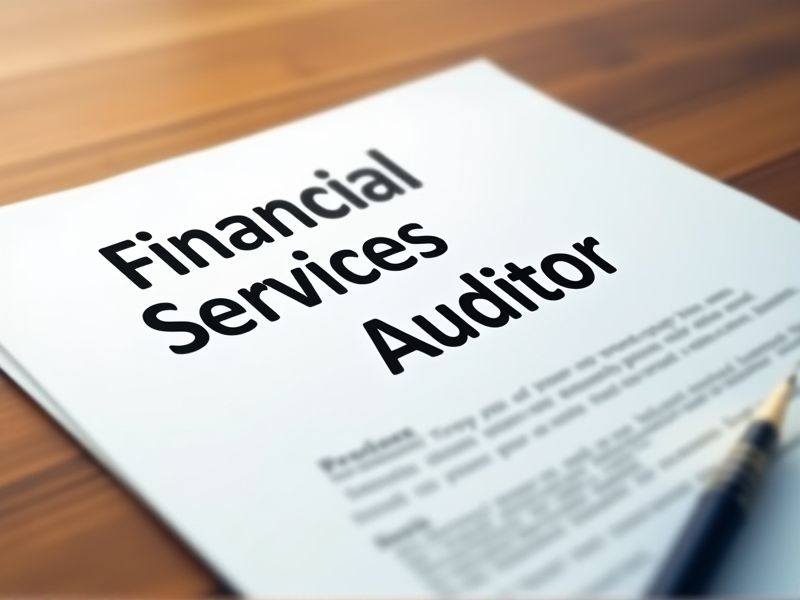
Financial Services Auditors play a crucial role in maintaining the integrity and accuracy of financial statements. Certifications ensure these auditors possess a deep understanding of regulatory requirements, risk management, and ethical standards crucial for accurate financial analysis. With increasing complexity in global finance, possessing specific certifications demonstrates an auditor's expertise and dedication to continuous professional development. Important certifications for a Financial Services Auditor include those that enhance specialized knowledge and skills.
Certified Public Accountant (CPA)
The complexity of financial regulations necessitates a Certified Public Accountant for a meticulous evaluation of compliance and reporting standards. CPAs possess the expertise to assess financial statements, ensuring accuracy and transparency for stakeholders. Their qualifications are vital in identifying potential discrepancies, thus reducing the risk of fraud or error. Regulators and investors often mandate CPA involvement to instill confidence in the audit process and bolster market credibility.
Certified Internal Auditor (CIA)
Certified Internal Auditors bring specialized skills that enhance the credibility and accuracy of financial assessments, essential for maintaining trust in financial services. This certification ensures auditors are equipped with the knowledge to thoroughly evaluate risk management and compliance, reducing potential financial loss. Financial services often face complex regulatory requirements, and CIAs possess the understanding needed to navigate these challenges effectively. Hiring CIAs can lead to improved operational efficiencies by identifying areas for financial improvement and safeguarding against fraud.
Certified Information Systems Auditor (CISA)
Certified Information Systems Auditor (CISA) certification validates an auditor's expertise in assessing vulnerabilities and implementing IT controls, which is critical for ensuring the integrity of financial data. Financial services heavily rely on Information Technology systems to manage transactions, and CISA certifies professionals to evaluate and enhance these systems' security, reliability, and compliance. Data breaches and cyber threats pose significant risks to financial information, and a CISA-certified auditor is equipped with the skills to mitigate these threats and protect sensitive information. Regulatory bodies require strict compliance and reporting standards within financial services, and CISA provides auditors with the framework to meet these requirements effectively.
Certified Fraud Examiner (CFE)
The presence of a Certified Fraud Examiner (CFE) in financial services auditing enhances the ability to detect and prevent fraud through specialized expertise in fraud mechanisms. CFEs bring a rigorous understanding of accounting and auditing skills, which is essential for identifying irregularities and vulnerabilities within financial systems. Their knowledge extends to legal frameworks, allowing them to navigate and implement anti-fraud measures effectively. The unique skills of CFEs contribute to maintaining integrity and trust in financial reporting and auditing processes.
Financial Risk Manager (FRM)
The complexity and volatility of financial markets require a Financial Risk Manager (FRM) to ensure accurate risk assessment and management. This expertise aids a Financial Services Auditor in evaluating the effectiveness of a company's financial strategies and compliance with regulations. The FRM's insights into potential market risks enable auditors to identify financial vulnerabilities and strengthen internal controls. Their knowledge enhances the audit process, fostering more informed decision-making and risk mitigation strategies for financial institutions.
Certified Anti-Money Laundering Specialist (CAMS)
A Certified Anti-Money Laundering Specialist (CAMS) enhances a financial services auditor's ability to detect and prevent money laundering activities. Possessing a CAMS certification means the auditor is equipped with the latest industry knowledge and best practices, improving the accuracy and effectiveness of audits. Financial institutions face increased regulatory scrutiny, making it essential for auditors to understand complex compliance requirements, which CAMS provides. Having a specialized skill set in anti-money laundering through CAMS can strengthen an auditor's credibility and trustworthiness, critical for maintaining financial integrity.
Chartered Financial Analyst (CFA)
The Chartered Financial Analyst (CFA) designation equips financial services auditors with a deep understanding of complex financial instruments, enhancing their ability to accurately assess financial statements. Possessing a CFA credential implies a high standard of ethical practice and professionalism, valuable in building trust with stakeholders during audits. Auditors with CFA training are adept at evaluating risk management and investment strategies, which are crucial for effective audits in financial services. The rigorous analytical skills honed through CFA preparation enable auditors to identify inconsistencies and potential issues with greater precision.
Certified Government Auditing Professional (CGAP)
The Certified Government Auditing Professional (CGAP) credential equips financial services auditors with the specialized knowledge required to navigate the complexities of government auditing standards and regulations. This certification enhances auditors' ability to evaluate compliance and risk management in public sector financial operations effectively. The CGAP designation can improve trust and credibility among stakeholders, promoting transparency in financial services linked to government entities. CGAP-certified auditors often demonstrate enhanced skill in detecting inefficiencies and potential areas of fraud, which contributes to stronger internal controls and governance.
Certified Risk Management Assurance (CRMA)
Financial services auditors need the Certified Risk Management Assurance (CRMA) designation because risk management directly influences financial stability and compliance. The CRMA imparts auditors with advanced knowledge and skills to assess and improve risk management strategies, vital in high-stakes financial environments. CRMA certification also enhances auditors' ability to provide valuable assurance services by recognizing and addressing complex risk scenarios. This qualification bolsters employer confidence by ensuring that auditors are proficient in aligning risk management with business objectives.
Certified Regulatory Compliance Manager (CRCM)
The Certified Regulatory Compliance Manager (CRCM) credential equips financial services auditors with deep knowledge of regulatory requirements, enhancing their ability to ensure organizations meet legal standards. Possessing CRCM certification improves an auditor's credibility and reliability when assessing compliance risks within financial institutions. Auditors with a CRCM background can effectively identify and mitigate compliance-related issues, reducing the likelihood of regulatory penalties. The credential also indicates a commitment to ongoing professional development, which is crucial in the constantly evolving regulatory environment of financial services.
Summary
When a reader pursues certifications as a Financial Services Auditor, they can significantly boost their professional credibility. This increased credibility often opens doors to higher-level positions and more attractive salary offers. Certified auditors are generally perceived as more knowledgeable and skilled, leading to greater trust from clients and employers. The combined effect of these factors typically results in enhanced career advancement opportunities.
